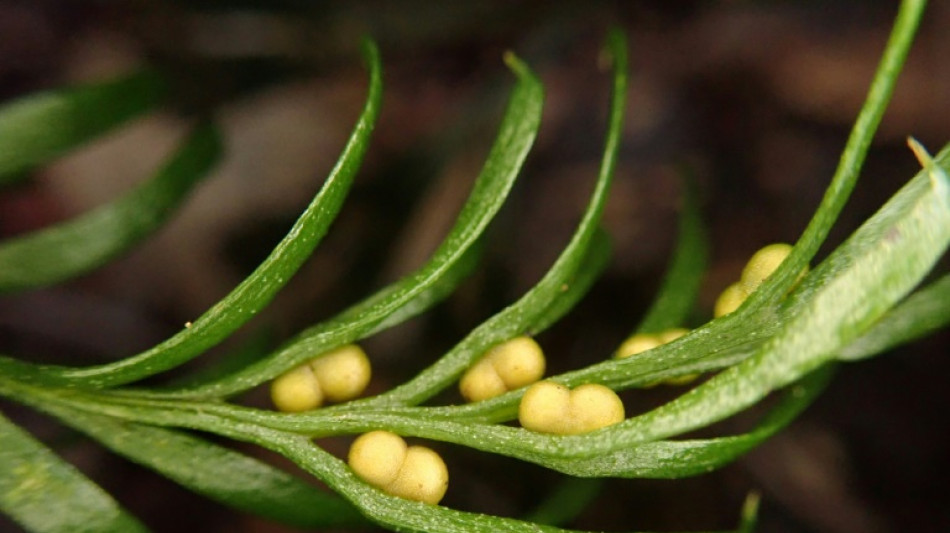
-
 Bangladesh launches campaigns for first post-Hasina elections
Bangladesh launches campaigns for first post-Hasina elections
-
Afghan resistance museum gets revamp under Taliban rule

-
 Multiple people missing in New Zealand landslips
Multiple people missing in New Zealand landslips
-
Sundance Film Festival hits Utah, one last time

-
 Philippines convicts journalist on terror charge called 'absurd'
Philippines convicts journalist on terror charge called 'absurd'
-
Anisimova grinds down Siniakova in 'crazy' Australian Open clash

-
 Djokovic rolls into Melbourne third round, Keys defence alive
Djokovic rolls into Melbourne third round, Keys defence alive
-
Vine, Narvaez take control after dominant Tour Down Under stage win

-
 Chile police arrest suspect over deadly wildfires
Chile police arrest suspect over deadly wildfires
-
Djokovic eases into Melbourne third round - with help from a tree

-
 Keys draws on champion mindset to make Australian Open third round
Keys draws on champion mindset to make Australian Open third round
-
Knicks halt losing streak with record 120-66 thrashing of Nets

-
 Philippine President Marcos hit with impeachment complaint
Philippine President Marcos hit with impeachment complaint
-
Trump to unveil 'Board of Peace' at Davos after Greenland backtrack

-
 Bitter-sweet as Pegula crushes doubles partner at Australian Open
Bitter-sweet as Pegula crushes doubles partner at Australian Open
-
Hong Kong starts security trial of Tiananmen vigil organisers

-
 Keys into Melbourne third round with Sinner, Djokovic primed
Keys into Melbourne third round with Sinner, Djokovic primed
-
Bangladesh launches campaigns for first post-Hasina polls

-
 Stocks track Wall St rally as Trump cools tariff threats in Davos
Stocks track Wall St rally as Trump cools tariff threats in Davos
-
South Korea's economy grew just 1% in 2025, lowest in five years

-
 Snowboard champ Hirano suffers fractures ahead of Olympics
Snowboard champ Hirano suffers fractures ahead of Olympics
-
'They poisoned us': grappling with deadly impact of nuclear testing

-
 Keys blows hot and cold before making Australian Open third round
Keys blows hot and cold before making Australian Open third round
-
Philippine journalist found guilty of terror financing

-
 Greenlanders doubtful over Trump resolution
Greenlanders doubtful over Trump resolution
-
Real Madrid top football rich list as Liverpool surge

-
 'One Battle After Another,' 'Sinners' tipped to top Oscar noms
'One Battle After Another,' 'Sinners' tipped to top Oscar noms
-
Higher heating costs add to US affordability crunch

-
 Eight stadiums to host 2027 Rugby World Cup matches in Australia
Eight stadiums to host 2027 Rugby World Cup matches in Australia
-
Plastics everywhere, and the myth that made it possible

-
 Interim Venezuela leader to visit US
Interim Venezuela leader to visit US
-
Australia holds day of mourning for Bondi Beach shooting victims

-
 Liverpool cruise as Bayern reach Champions League last 16
Liverpool cruise as Bayern reach Champions League last 16
-
Fermin Lopez brace leads Barca to win at Slavia Prague

-
 Newcastle pounce on PSV errors to boost Champions League last-16 bid
Newcastle pounce on PSV errors to boost Champions League last-16 bid
-
Fermin Lopez brace hands Barca win at Slavia Prague

-
 Kane double fires Bayern into Champions League last 16
Kane double fires Bayern into Champions League last 16
-
Newcastle pounce on PSV errors to close in on Champions League last 16

-
 In Davos speech, Trump repeatedly refers to Greenland as 'Iceland'
In Davos speech, Trump repeatedly refers to Greenland as 'Iceland'
-
Liverpool see off Marseille to close on Champions League last 16

-
 Caicedo strikes late as Chelsea end Pafos resistance
Caicedo strikes late as Chelsea end Pafos resistance
-
US Republicans begin push to hold Clintons in contempt over Epstein

-
 Trump says agreed 'framework' for US deal over Greenland
Trump says agreed 'framework' for US deal over Greenland
-
Algeria's Zidane and Belghali banned over Nigeria AFCON scuffle

-
 Iran says 3,117 killed during protests, activists fear 'far higher' toll
Iran says 3,117 killed during protests, activists fear 'far higher' toll
-
Atletico frustrated in Champions League draw at Galatasaray

-
 Israel says struck Syria-Lebanon border crossings used by Hezbollah
Israel says struck Syria-Lebanon border crossings used by Hezbollah
-
Snapchat settles to avoid social media addiction trial

-
 'Extreme cold': Winter storm forecast to slam huge expanse of US
'Extreme cold': Winter storm forecast to slam huge expanse of US
-
Jonathan Anderson reimagines aristocrats in second Dior Homme collection


'Innocuous-looking' fern wins world record for largest genome
A small, seemingly unremarkable fern that only grows on a remote Pacific island was on Friday crowned the Guinness World Record holder for having the largest genome of any organism on Earth.
The New Caledonian fern, Tmesipteris oblanceolata, has more than 50 times more DNA packed into the nucleus of its cells than humans do.
If the DNA from one of the fern's cells -- which are just a fraction of a millimetre wide -- were unravelled, it would stretch out to 106 metres (350 feet), scientists said in a new study.
Stood upright, the DNA would be taller that than the tower that holds London's famous Big Ben bell.
The fern's genome weighed in at a whopping 160 gigabase pairs (Gbp), the measurement for DNA length.
That is seven percent larger than the previous record holder, the Japanese flowering plant Paris japonica.
The human genome is a relatively puny 3.1 Gbp.
If our DNA were unravelled, it would be around two metres long.
Study co-author Ilia Leitch, a researcher at the UK's Royal Botanic Gardens Kew, told AFP that the team was "really surprised to find something even bigger than Paris japonica".
"We thought we'd already reached the biological limit. We're really pushing at the extremes of biology," she said.
The fern, which grows five to 10 centimetres tall, is only found in New Caledonia, a French Pacific territory which has recently seen unrest.
Two members of the research team travelled to the main island, Grand Terre, in 2023 and worked with local scientists for the study, which was published in the journal iScience.
Guinness World Records awarded the fern its coveted "largest genome title".
The win by "this innocuous-looking" fern demonstrates that "record holders aren't always the showiest on the outside", Guinness World Records managing editor Adam Millward said.
- What's a genome again? -
Humans are estimated to have more than 30 trillion cells in our bodies.
Within each of those cells is a nucleus which contains DNA, which is like a "book of instructions that tells an organism like ourselves how to live and survive", Leitch explained.
All of an organism's DNA is called its genome.
So far, scientists have estimated the genome size of around 20,000 organisms, just a fraction of life on Earth.
Among animals, the marbled lungfish has the largest, with 130 Gbp.
While plants have the biggest genomes, they can also have incredibly small ones. The carnivorous Genlisea aurea's genome is just 0.06 Gbp.
But we humans need not feel inadequate when comparing ourselves to the mighty T. oblanceolata.
All the evidence suggests that having a huge genome is a disadvantage, Leitch said.
The more DNA you have, the larger your cells need to be to squeeze it all in.
For plants, bigger cells mean things like the pores of leaves have to be larger, which can make them grow more slowly.
It is also trickier to make new copies of all that DNA, limiting their reproductive abilities.
This means the most massive genomes are seen in slow-growing, perennial plants which cannot easily adapt to adversity or contend with competition.
Genome size can therefore affect how plants respond to climate change, changing land use and other environmental challenges caused by humans, Leitch said.
- What's all that DNA for? -
There could still be bigger genomes somewhere out there but Leitch thinks this fern must be near the limit.
"I cannot understand how an organism with all this DNA really functions," she said.
Scientists do not know what most of the DNA does in such huge genomes, she admitted.
Some say most of it is "junk DNA".
"But that's probably our own ignorance. Maybe it does have a function, and we have yet to find it," Leitch said.
Jonathan Wendel, a botanist at Iowa State University not involved in the research, agreed it was "astonishing" how much DNA the fern is packing.
But this only "represents the first step", he told AFP.
"A great mystery is the meaning of all of this variation -- how do genomes grow and shrink, and what are the evolutionary causes and consequences of these phenomena?"
K.Hofmann--VB



